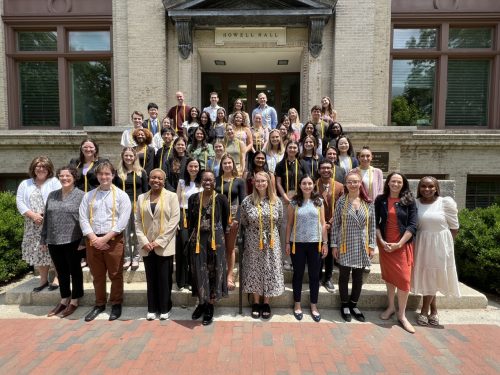Honors Program in Psychology and Neuroscience

The Senior Honors Program in the Department of Psychology and Neuroscience has two components:
- Students conduct an independent research project in the laboratory of a faculty member who is affiliated either with the Department of Psychology and Neuroscience or with the Neuroscience major, and
- Students enroll in and complete PSYC/NSCI 693H (Fall) and PSYC/NSCI 694H (Spring), which meet once per week.
Enrollment in the Honors Program is not restricted to students who have participated in UNC Honors Carolina and Psychology majors and Neuroscience majors who have been in the UNC Honors Program do not necessarily complete Senior Honors.
In order to graduate with Honors in Psychology or Neuroscience, you must apply by April 16 of your Junior Year.
Apply for Honors Program
Eligibility for the Honors Program requires:
- Minimum cumulative GPA of 3.3
- Prior research experience (e.g., volunteer or paid research experience that was not for course credit; in-process completion of PSYC 395 or NSCI 395
- Confirmation of a Psychology and Neuroscience faculty member or a faculty member affiliated with the Neuroscience major to serve as your Honors Advisor or Co-mentor (see FAQ section below: “What if my Research Mentor is not a Faculty Member in Psychology & Neuroscience?”)
Application form: https://forms.gle/6iLBdNcbmd9U553AA
Advisor reference form: https://forms.gle/KBGNEs88x6ncZ24J8
Have an additional question? Please check out our 2021 Senior Honors Program Information Session [Zoom].
Frequently Asked Questions
How Do I Prepare for the Honors Program as an Underclassman?- Apply yourself in your courses to maintain a minimum cumulative GPA of 3.3, which is a requirement for admission into the program.
- Read about research and talk to professors, graduate students, and other undergraduates about your research interests. Think about the types of research you’d like to do. Keep a notebook of research ideas.
- Achieve a mastery of research skills. Take PSYC 210 and 270 as soon as this is feasible as these courses teach basic skills that are important for research. You must also obtain research experience by volunteering to work in a faculty lab or by taking PSYC/NSCI 395.
- Learn about the program by talking to faculty and students. Make an appointment or email questions to the Honors Program Director.
- Seek out research opportunities via research intensive courses, independent research experiences, paid research assistant positions, and volunteer positions. It is strongly advised that students take PSYC 210, PSYC 270, and PSYC/NSCI 395 before applying to develop necessary skills and research interests.
- Plan ahead. The Honors Program is designed to be completed during two semesters of the senior year (i.e., you must be on-campus and enrolled both fall and spring semesters). Thus, study abroad during senior year, December graduation, and other educational opportunities may preclude participation in the Honors Program. If you have questions about your eligibility, please make an appointment with the Honors Program Director.
- Identify a faculty member to serve as your Honors Advisor. Explore our faculty’s research interests and read research articles to see if a faculty member’s research reflects your interests. A potential Honors Advisor may be identified during PSYC/NSCI 395. If you have difficulty identifying a sponsor, contact the Honors Program Director.
- Apply on time. Applications should be submitted by April 16th of your junior year.
- The completed thesis must be distributed to all committee members at least one week prior to the oral defense meeting. The Oral Defense Form must be completed and provided to your Honors Advisor prior to the meeting.
- Students present their research in about 15 minutes during the oral defense meeting. The committee will ask questions and the meeting typically takes an hour. Any revisions recommended by the Honors Committee must be made before the deadline for thesis submission. The final copy of the thesis, after approval, should be submitted to the Carolina Digital Repository. All students must participate in the Honors Poster Session as a requirement of program completion.
Honors Theses
Past Honors Theses are listed below in PDF format.
- 2021-22 Honors Theses
- 2020-21 Honors Theses
- 2019-20 Honors Theses
- 2018-19 Honors Theses
- 2017-18 Honors Theses
- 2016-17 Honors Theses
- 2015-16 Honors Theses
- 2014-15 Honors Theses
- 2013-14 Honors Theses
- 2012-13 Honors Theses
- 2011-12 Honors Theses
- 2010-11 Honors Theses
- 2009-10 Honors Theses
- 2008-09 Honors Theses
- 2007-08 Honors Theses
Check out photos of our past Senior Honors Cohorts online!
Contact Us
Dr. Keely Muscatell
Psychology and Neuroscience Honors Program Director, Fall 2023 – Spring 2024
328 Davie Hall
kmuscatell@unc.edu
Andrew Bresson
Undergraduate Student Services Manager
206B Davie Hall
919-843-0174
psycneuroussm@unc.edu

